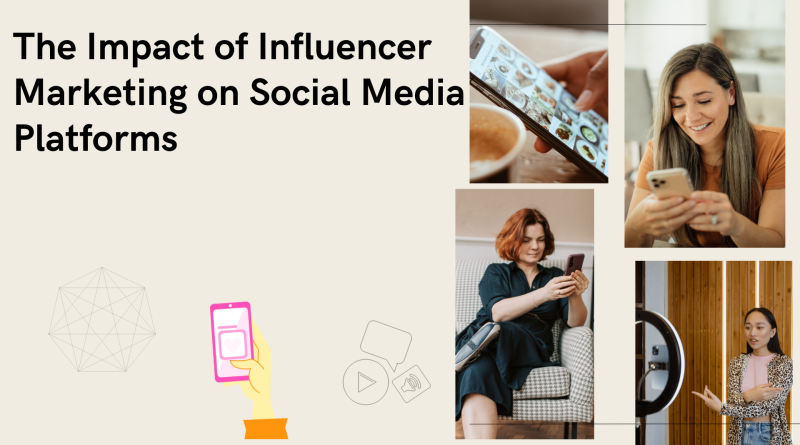5 Dynamic Impact of Influencer Marketing on Social Media Platforms
Table of Contents
Power of Influencer Marketing in the Digital Era
In today’s digital age, Influencer marketing on social media platforms has become more than just tools for connecting with friends and sharing updates they’ve evolved into powerful marketing channels for brands to reach their target audiences.
Among the various strategies employed by businesses, influencer marketing has emerged as a particularly impactful approach, reshaping the landscape of social media marketing in profound ways.
Who are Influencers?

Influencers are individuals who have established credibility, authority, or expertise in a specific niche or industry, and who have built a dedicated following on social media platforms. They use their influence to engage with their audience, create compelling content, and shape opinions and behaviors.
Influencers can come from various backgrounds and fields, such as fashion, beauty, fitness, travel, technology, gaming, and more. They leverage their platform to share insights, recommendations, and experiences with their followers, often collaborating with brands to promote products or services to their audience.
The Impact of Influencer Marketing on Social Media Platforms

1. Enhanced Brand Awareness and Reach
Influencer marketing on social media has redefined brand awareness strategies on social media platforms. By collaborating with influencers who boast dedicated followings, brands can significantly expand their reach beyond their existing audience.
This expanded reach allows brands to tap into new markets and demographics that may have been previously inaccessible through traditional marketing channels alone.
2. Building Trust and Authenticity
Perhaps one of the most significant impacts of influencer marketing is its ability to foster trust and authenticity. Influencers have cultivated strong relationships with their followers, who perceive them as trusted sources of information and recommendations.
When influencers endorse a product or service, it lends credibility and authenticity to the brand in the eyes of their audience. This trust, built over time through consistent, authentic content, can significantly influence purchasing decisions.
3. Driving Engagement and Interaction

Influencers often enjoy high levels of engagement on their content, with followers actively liking, commenting, and sharing their posts. Brands leveraging influencer marketing can capitalize on this engagement to foster meaningful interactions with potential customers.
By collaborating with influencers, brands can initiate genuine conversations and connections with their target audience, leading to increased brand loyalty and advocacy.
4. Targeted Marketing Strategies
Influencers typically specialize in specific niche topics or interests, making them invaluable partners for brands seeking to execute targeted marketing campaigns. By partnering with influencers whose audience aligns with their target demographic, brands can ensure.
That their message resonates with the right people at the right time. This targeted approach enhances the effectiveness of marketing efforts, resulting in higher conversion rates and improved return on investment.
5. Leveraging Creative Content
Influencers are skilled at creating compelling and engaging content that resonates with their audience. Brands can leverage the creativity and expertise of influencers to produce high-quality content that aligns with their brand message and values. Collaborating with influencers not only ensures the creation of authentic content but also helps brands connect with consumers in a more meaningful and impactful way.
How Influencers are Used as a Marketing Strategy
Product Reviews and Endorsements: Influencers often review products or services within their niche and share their experiences with their audience. Positive reviews or endorsements from influencers can significantly impact consumer perception and drive sales.
Sponsored Content: Brands collaborate with influencers to create sponsored posts or videos featuring their products or services. These collaborations are usually disclosed as paid partnerships and are tailored to fit seamlessly into the influencer’s content style.
Giveaways and Contests: Influencers may host giveaways or contests sponsored by brands, where followers have the chance to win prizes by engaging with the influencer’s content or by following specific brand-related actions.
Brand Ambassadorships: Brands may partnerships with influencers to serve as brand ambassadors. Brand ambassadors regularly promote the brand’s products or services over an extended period, helping to build brand loyalty among their audience.
Affiliate Marketing: Influencers share unique discount codes or affiliate links with their followers, earning a commission for every sale generated through their referral. This strategy incentivizes influencers to drive sales while providing their audience with exclusive discounts.
Event Partnerships: Brands often collaborate with influencers to promote events, product launches, or activations. Influencers may attend the event, share real-time updates on social media, or create pre-event buzz to drive attendance and engagement.
Content Creation Collaboration: Brands may collaborate with influencers to co-create content, such as sponsored blog posts, videos, or social media campaigns. This collaborative approach ensures that the brand’s message is delivered authentically through the influencer’s unique voice and style.





